Eduard Julius Ludwig von Lewinski was a Prussian general. His younger brother Alfred von Lewinski also became a Prussian general.
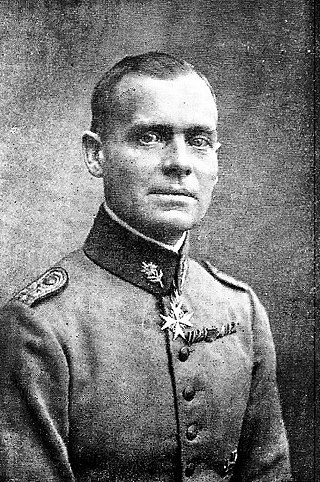
Heinrich Kirchheim was a German generalleutnant who served in both World War I and World War II. He is also one of few German officers who were awarded the Pour le Mérite and the Knight's Cross of the Iron Cross. He also served as a deputy member on the "Court of Military Honour," a drumhead court-martial that expelled many of the officers involved in the 20 July Plot from the Army before handing them over to the People's Court.

Hugo Ewald Graf von Kirchbach was a Prussian general who commanded the Prussian V Corps during the Franco-Prussian War.
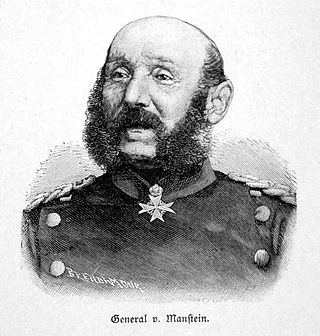
Albert Ehrenreich Gustav von Manstein was a Prussian general who served during the Austro-Prussian War and the Franco-Prussian War. He was the adoptive grandfather of Erich von Manstein.

Gustav Adolf von Wulffen was a German highly decorated officer in the Wehrmacht with the rank of Generalmajor and SS-Officer with the rank of SS-Brigadeführer. He was decorated with the highest prussian decoration for bravery, Pour le Mérite on April 21, 1918, as Battalion Commander.

Hermann Josef von Kuhl was a Prussian military officer, member of the German General Staff, and a Generalleutnant during World War I. One of the most competent commanders in the German Army, he retired in 1919 to write a number of critically acclaimed essays on the war. Hermann von Kuhl is one of only three recipients to be distinguished with both the "military class" and "peace class" of the Pour le Mérite, Prussia's and Germany's highest honor.
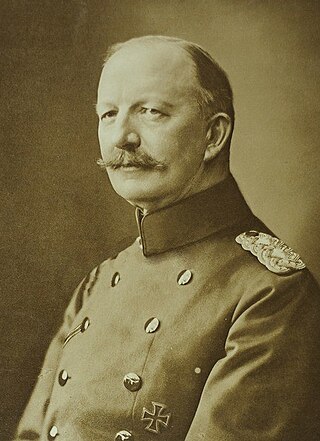
Herrmann Gustav Karl Max von Fabeck was a Prussian military officer and a German General der Infantarie during World War I. He commanded the 13th Corps in the 5th Army and took part in the Race to the Sea on the Western Front and also commanded the new 11th Army on the Eastern Front. Subsequently, he commanded several German armies during the war until his evacuation from the front due to illness in 1916 and died on 16 December. A competent and highly decorated commander, von Fabeck is a recipient of the Pour le Mérite, Prussia's and Germany's highest military honor.

Karl Freiherr von Plettenberg was a Prussian officer, and later General of Infantry during World War I. He was Commandant-General of the Guards Corps, Adjutant General of the German Kaiser Wilhelm II and a recipient of Pour le Mérite.
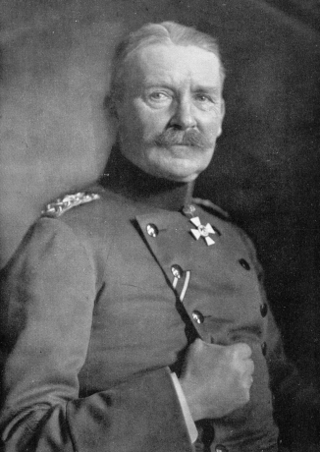
Alexander Ferdinand Ludolf von Quast was a Prussian military officer, participant in the Franco-Prussian War and a general in the First World War. He commanded the German 6th Army during the Battle of the Lys of the Spring Offensive in 1918.

Karl Christof Friedrich von Gerok was an officer of Württemberg, general of the infantry of the XXIV Reserve Corps during World War I.

Robert Paul Theodor von Kosch was a Prussian General of the Infantry during World War I.

Theodor Wilhelm Gustav Erich Gündell, from 1901 named von Gündell, was a Prussian officer, most noted as a general of infantry in World War I.

Eduard Georg Gustav von Below was a German General of the Infantry who notably served in World War I.

Johannes von Busse was a German lieutenant general who was most notable for his service in the Romanian Campaign of World War I.

Georg Wetzell was a German General of the Infantry and from 1925 to 1927 chief of the Truppenamt of the Reichswehr.
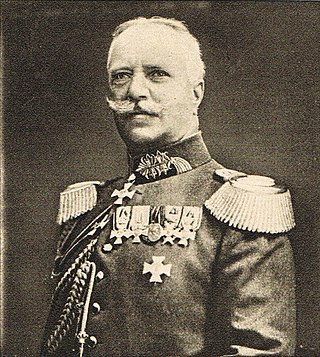
Richard Heinrich Karl von Conta was a German General der Infanterie during World War I. He was notable for his participation in the Battle of Belleau Wood.

Franz Martin Chales de Beaulieu was a German general in World War I. He was also involved in the Herero Wars as chief of staff to Lothar von Trotha.

Georg Karl Kuno Alfred von Larisch was a German General of the Infantry during World War I. He commanded the 10th Division, the 81st Reserve Division, the Guard Ersatz Division, and the Generalkommando z.b.V. 54 on the Western and Eastern fronts.

Alfred Hans Emil Friedrich von Böckmann (1859-1921) was a German general in World War I. He commanded several corps throughout the war and commanded the Guard Corps during the Fifth Battle of Ypres.
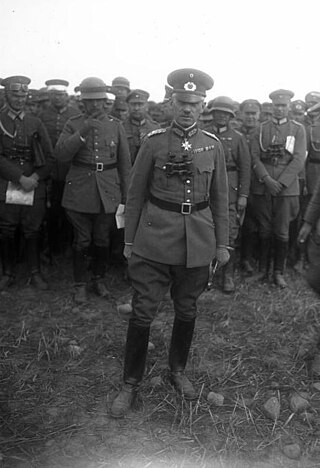
Otto Hasse was a German General of the Infantry and from 1923 to 1925 Chief of the Truppenamt.



















